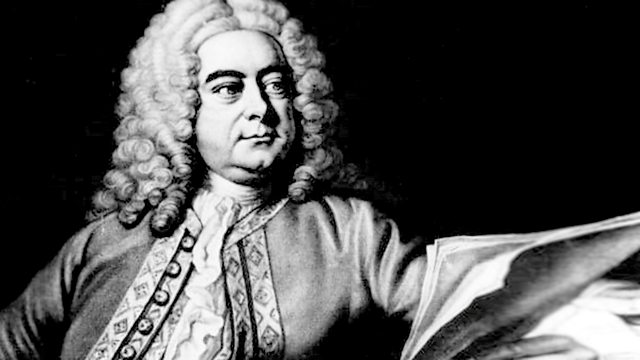
Volant fingers
This week Donald Macleod focuses on Handel the organist. Today, Handel impresses the Duke of Saxe-Weissenfels, dazzles his Roman audiences and invents the organ concerto.
This week Donald Macleod focuses on Handel the organist. Today, Handel impresses the Duke of Saxe-Weissenfels, dazzles his Roman audiences and invents the organ concerto.
“A fine and delicate touch, a Volant finger and a ready delivery of passages the most difficult, are the praise of inferior artists. They were not noticed in Handel, whose excellencies were of a far superior kind, and his amazing command of the instrument, the fullness of his harmony, the grandeur and dignity of his style, the copiousness of his imagination, and the fertility of his invention were qualities that absorbed every inferior attainment.” So wrote Handel’s biographer John Hawkins, attempting to capture in words the effect made on him by the almost ineffably brilliant organ-playing of his subject. Things could have turned out very differently. Handel’s father, court surgeon to Johann Adolf I, Duke of Saxe-Weissenfels, had wanted his son to pursue a career in the law, but fate intervened when the Duke overheard young Georg Frideric playing the organ after service one Sunday and strongly encouraged Georg senior to allow his son to have a musical training. Within a few years, Handel left to seek his fortune in Italy, where a contemporary account has a snapshot of him playing the organ in Rome, “to the astonishment of everyone”. At this point in his life, the organ was an instrument Handel improvised on rather than – with a handful of exceptions – composed for, and it’s not until the mid 1730s that he produced the first of his organ concertos, for performance between the acts of a revival of his oratorio Esther.
Handel: Il Trionfo del Tempo e del Disinganno, HWV 46a; (Sonata – ‘Taci, qual suono ascolto’)
Le Concert d’Astrée
Emmanuelle Haïm, organ and direction
Fugue in G, HWV 606
Ton Koopman, organ of St James’, Great Packington
Concerto Grosso in D, Op 3 No 6 (HWV 317)
Les Musiciens du Louvre
Marc Minkowski, conductor
Deborah, HWV 51 (Act 2, ‘In the battle, fame pursuing’)
James Bowman, countertenor (Barak)
Paul Nicholson, chamber organ
The King’s Consort
Robert King, conductor
Esther, HWV 50b (Act 1 scene 1, extract)
Rebecca Outram, soprano (Israelite woman)
Rosemary Joshua, soprano (Esther)
Handel Orchestra and Chorus
Laurence Cummings, conductor
Organ Concerto in B flat, Op 4 No 2 (HWV 290)
Ottavio Dantone, organ and direction
Accademia Bizantina
Esther, HWV 50b (Act 2 scene 4, extract)
Handel Orchestra and Chorus
Laurence Cummings, conductor
Producer: Chris Barstow
Last on
More episodes
Previous
You are at the first episode
Music Played
-
![]()
George Frideric Handel
Il Trionfo del Tempo e del Disinganno, HWV 46a; Sonata - 'Taci, qual suono ascol
Singer: Natalie Dessay. Ensemble: Le Concert d’Astrée. Conductor: Emmanuelle Haïm.- VIRGIN CLASSICS : 094636-342825.
- VIRGIN CLASSICS.
- 19.
-
![]()
George Frideric Handel
Fugue in G, HWV 606
Performer: Ton Koopman.- CAPRICCIO:C10 254.
- CAPRICCIO.
- 8.
-
![]()
George Frideric Handel
Deborah - oratorio - In the battle, fame pursuing
Singer: James Bowman. Singer: Susan Gritton. Singer: Yvonne Kenny. Choir: New College Oxford Choir. Conductor: Edward Higginbottom. Ensemble: The King’s Consort. Director: Robert King.- HYPERION : CDA-66841/2.
- HYPERION.
- 8.
-
![]()
George Frideric Handel
Concerto grosso in D major Op.3`6
Ensemble: Les Musiciens du Louvre. Performer: Aline Zylberajch. Conductor: Marc Minkowski.- ERATO : 4509--94354-2.
- ERATO.
- 5.
-
![]()
George Frideric Handel
Esther - Act 2 scene 4 - Blessed are all they that fear the Lord
Singer: Rebecca Outram. Singer: Rosemary Joshua. Orchestra: Handel Opera Orchestra. Choir: Handel Opera Chorus. Conductor: Laurence Cummings.- Somm: SOMM238-9.
- Somm.
- 7.
Broadcasts
- Mon 5 Dec 2016 12:00BBC Radio 3
- Mon 5 Dec 2016 18:30BBC Radio 3
- Mon 27 Apr 2020 12:00BBC Radio 3








